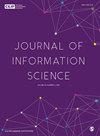LEGO: Linked electronic government ontology
IF 1.7
4区 管理学
Q3 COMPUTER SCIENCE, INFORMATION SYSTEMS
引用次数: 1
Abstract
E-government services are subject to a growing level of complexity, which requires a disruptive approach that better support the citizen needs concerning the government administration. Nowadays, available information technologies facilitate the description and online execution of administrative tasks, saving time and reducing possible errors. These technologies reduce administrative costs but require a complex electronic government system. We propose using semantic technologies to describe the e-government organisational units and services in the Open Government Data and Services context. The use of semantics improves government management, service delivery and decision-making processes. This article presents an extension of related work, introducing the evolution of the Ontology for Electronic Government (EGO): integrating other existing ontologies, supporting new features to describe e-government services and widening the usage scenarios. This extension enables the use in a real scenario with four use cases: the electronic government in the Province of Misiones (Argentina). However, the use in the domain of electronic government in a provincial context is also a proof of concept that this approach is general enough to expand into superior domains of countries that adopt the republican system of government with the division of government into the executive, legislative and judicial branches.乐高:关联电子政府本体
电子政务服务的复杂性越来越高,这就需要一种颠覆性的方法来更好地支持公民对政府管理的需求。如今,可用的信息技术促进了管理任务的描述和在线执行,节省了时间并减少了可能的错误。这些技术降低了行政成本,但需要一个复杂的电子政务系统。我们建议使用语义技术来描述开放政府数据和服务背景下的电子政务组织单元和服务。语义的使用改善了政府管理、服务提供和决策过程。本文介绍了相关工作的扩展,介绍了电子政务本体(EGO)的演变:集成其他现有本体,支持描述电子政务服务的新特性,并扩展了使用场景。这个扩展可以在四个用例的真实场景中使用:米西奥内斯省(阿根廷)的电子政府。然而,在省级背景下电子政务领域的使用也证明了这一概念,即这种方法足够普遍,可以扩展到采用共和政府制度的国家的高级领域,这些国家的政府分为行政、立法和司法部门。
本文章由计算机程序翻译,如有差异,请以英文原文为准。
求助全文
约1分钟内获得全文
求助全文
来源期刊

Journal of Information Science
工程技术-计算机:信息系统
CiteScore
6.80
自引率
8.30%
发文量
121
审稿时长
4 months
期刊介绍:
The Journal of Information Science is a peer-reviewed international journal of high repute covering topics of interest to all those researching and working in the sciences of information and knowledge management. The Editors welcome material on any aspect of information science theory, policy, application or practice that will advance thinking in the field.
 求助内容:
求助内容: 应助结果提醒方式:
应助结果提醒方式:


